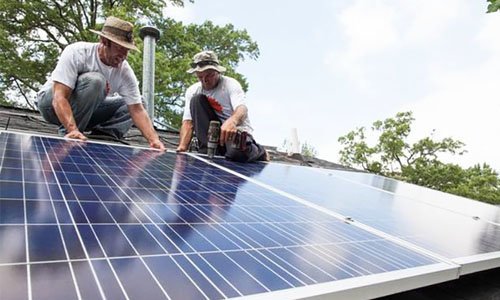

You may have noticed that the influence of corporate money in politics has become a hot issue on the campaign trail. All the candidates are talking about it, from Bernie Sanders to Ted Cruz.
And Greenpeace has been chattering more than usual about it since we, along with more than 20 partners, launched a pledge asking all candidates to start fixing democracy by both rejecting campaign contributions from fossil fuel companies and protecting voting rights.
With all that chatter, it may be easy to lose sight of what is actually wrong with big money in politics. What are the real-world consequences of politicians bought by corporate money and influence? How does a cozy relationship between a governor and a lobbyist impact you and me?
Let us go to Nevada.
What Happened to Nevada’s Solar Energy Boom?
The Silver State is not only the next stop for the upcoming Republican and Democratic caucuses, following on the heels of the New Hampshire primary, it is also the site of a fierce debate around solar energy that has everything to do with money in politics.
Most people’s descriptions of Nevada include sunshine and lots of it, making it a natural place for a thriving solar market. Nevada was well on its way to becoming a national hotspot for affordable rooftop solar until a few months ago, when the ramifications of corporate influence over politics had its day in the sun.
Prior to a December decision by Nevada’s Public Utilities Commission, homeowners could not only enroll in affordable solar investment for their homes, they could also sell back any energy they didn’t use to the utility NV Energy, like rollover minutes on a cell phone plan. This is called net metering and is a common practice across the country. Basically, that customer gets credit for the energy it sends back to the local grid. High fives all around!
Unfortunately, the Nevada’s Public Utilities Commission struck a big blow against rooftop solar passed in December. The commission passed a resolution that hiked up the fees for solar customers and significantly lowered the payout for the electricity solar customers contribute back to the grid. The real bummer here is that when customers signed up for a solar rebate by installing panels on their roofs, they expected the rates to stay the same for years to come. Now, the cost of installation and maintenance of rooftop solar just got significantly more expensive for customers, forcing them to pay for electricity they are producing themselves.
The solar installation industry now employs more people than oil and gas extractive industries and does so without harming human health or the health of our climate. So why would any state—particularly one as swamped with sunshine as Nevada—suddenly unleash an attack on renewable and affordable solar energy?
The cozy relationship between the governor of Nevada and the state’s utility company might have something to do with it.
And in case you’re starting to lose perspective here, affordable access to solar energy is really important right now. Those changes made such an impact that SolarCity, the major provider for the solar installations in Nevada, pulled their company out of Nevada along with 500 jobs that could have benefited the state.
If we’re going to avoid catastrophic climate change, the world needs to be done with fossil fuels by 2050. That means every state should establish easy and affordable access to rooftop solar and a place like Nevada, which enjoys nearly 300 days of sunshine, should lead the pack on solar energy.
So why the quick change?

 233k
233k  41k
41k  Subscribe
Subscribe 
